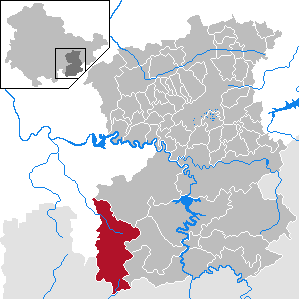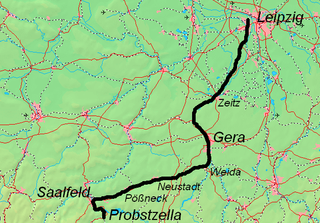This article relies largely or entirely on a single source .(May 2021) |
The 1919 Reuss-Gera state election was held on 2 February 1919 to elect the 21 members of the Landtag of Reuss-Gera. [1]
This article relies largely or entirely on a single source .(May 2021) |
The 1919 Reuss-Gera state election was held on 2 February 1919 to elect the 21 members of the Landtag of Reuss-Gera. [1]
| Party | Votes | % | Seats | |
|---|---|---|---|---|
| Social Democratic Party of Germany and Independent Social Democratic Party of Germany | 44,282 | 62.16 | 13 | |
| German National People's Party and German People's Party | 14,985 | 21.04 | 5 | |
| German Democratic Party | 11,968 | 16.80 | 3 | |
| Total | 71,235 | 100.00 | 21 | |
| Registered voters/turnout | 86,991 | – | ||
| Source: Elections in the Weimar Republic, [1] | ||||

Reuss was the name of several historical states located in present-day Thuringia, Germany. Several lordships of the Holy Roman Empire which arose after 1300 and became Imperial Counties from 1673 and Imperial Principalities in the late 18th century were ruled by the House of Reuss.

Gera is a city in the German state of Thuringia. With around 93,000 inhabitants, it is the third-largest city in Thuringia after Erfurt and Jena as well as the easternmost city of the Thüringer Städtekette, an almost straight string of cities consisting of the six largest Thuringian cities from Eisenach in the west, via Gotha, Erfurt, Weimar and Jena to Gera in the east. Gera is the largest city in the Vogtland, and one of its historical capitals along with Plauen, Greiz and Weida. The city lies in the East Thuringian Hill Country, in the wide valley of the White Elster, between Greiz (upstream) and Leipzig (downstream). Gera is located in the Central German Metropolitan Region, approximately 60 kilometres south of Saxony's largest city of Leipzig, 80 km east of Thuringia's capital Erfurt, 120 km west of Saxony's capital Dresden and 90 km north of Bavaria's city of Hof (Saale).
Greiz is a Kreis (district) in the east of Thuringia, Germany. Neighboring districts are Saale-Holzland, Saale-Orla, district-free city Gera, the Burgenlandkreis in Saxony-Anhalt, Altenburger Land, and the two Saxon districts Zwickau and Vogtlandkreis.

The Principality of Reuss-Gera, called the Principality of the Reuss Junior Line after 1848, was a sovereign state in modern Germany, ruled by members of the House of Reuss. It was one of the successor states of the Imperial County of Reuss. The Counts Reuss, with their respective capitals and Residenzen at Gera, Schleiz, Lobenstein, Köstritz and Ebersdorf, were all elevated to the title of prince (Fürst) in 1806. Their successor branch heads shared that title, while their cadets were also each titled prince (Prinz). Thus all males of the family were properly "Prince Heinrich Reuss, J.L.", without use of a nobiliary particle, although for convenience their branch names remained in colloquial use.

Hilbersdorf is a German municipality in the Thuringian district of Greiz. It belongs to the Verwaltungsgemeinschaft of Wünschendorf/Elster and lies in upper Wipsetal.

Tanna is a city in Thuringia, in the district of Saale-Orla-Kreis. It is located about 10 km south of Schleiz. Tanna was founded in 1495. The musicologist Paul Willert (1901–1988) was born in the city.

Bad Köstritz is a town in the district of Greiz, in Thuringia, Germany. It is situated on the White Elster river, 7 km northwest of Gera. Bad Köstritz is known for the Köstritzer brewery and its Schwarzbier.

Hohenleuben is a town in the district of Greiz, in Thuringia, Germany. It is situated 12 km northwest of Greiz, and 19 km south of Gera.

Saalburg-Ebersdorf is a town in the Saale-Orla-Kreis district, in Thuringia, Germany close to the Bavarian border. It is situated on the river Saale, 10 km southwest of Schleiz, 30 km west of Plauen and 30 km north-west of Hof.

Wurzbach is a town in the Saale-Orla-Kreis district, in southern Thuringia, Germany. It is situated 33 kilometres (21 mi) southeast of Saalfeld, and 45 kilometres (28 mi) northwest of Hof.

BSG Wismut Gera is a German association football club playing in Gera, Thuringia. The club is the successor to 1. SV Gera whose football department joined Blau-Weiß Gera and Geraer KFC Dynamos in 2007 to form FV Gera Süd, which, in turn, changed its name to BSG Wismut Gera in 2009.

The People's State of Reuss was a short-lived state in what is now Thuringia. The state was formed on 4 April 1919 after the reigning princes of the two Reuss principalities abdicated and elections were held in both states. The People's State of Reuss had a non-contiguous area of 1,143 square kilometers, 211,324 inhabitants (1919) and was divided into three districts.

Heinrich IV, Prince Reuss was the head of the German formerly noble House of Reuss.

The Leipzig–Probstzella railway is a line in the German states of Saxony, Saxony-Anhalt and Thuringia. It runs from Leipzig through the valley of the White Elster via Zeitz, Gera, Triptis, the Orlasenke lowland and Saalfeld to Probstzella. Since it runs parallel with the Saal Railway but is higher, it is also called the Obere Bahn.

The Reuss Chamber Orchestra is a German chamber orchestra in Gera (Thuringia), which sees itself as integral part of the Theater Altenburg-Gera.
Henry VI of Plauen was Burgrave of Meissen, Lord of Plauen and Lord of Schleiz and Lobenstein.
Henry X, Count of Reuss-Lobenstein was a German nobleman, and rector of the University of Leipzig.

Henry II of Reuss (younger line) (10 June 1572 in Gera – 23 December [O.S. 13 December] 1635 in Gera), nicknamed the Posthumous because his father died two months before he was born, was Lord of Gera, Lord of Lobenstein and Lord of Oberkranichfeld.

Heinrich XIII Prinz Reuss is a German businessman, far-right and monarchist activist, and member of a former aristocratic family. A proponent of the Reichsbürger movement and antisemitic conspiracy theories, Reuss was arrested by German Federal Police in December 2022 due to his alleged leadership in the 2022 German coup d'état plot.
Heinrich Reuss is the name of many male members of the German noble House of Reuss. It may refer to: